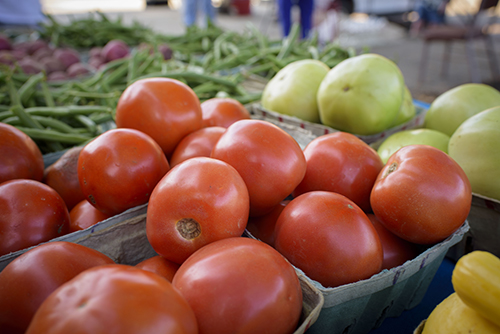Growing together: MSU Extension uses USDA grant to help Mississippi farmers
Contact: Sasha Steinberg
STARKVILLE, Miss.—Mississippi State University’s Extension Service is working to enhance direct sales, farmers markets, and local food development in northeast Mississippi as part of a new project “From Gravel Roads to City Streets” funded by USDA’s Agricultural Marketing Service.
Rachael Carter, Extension economist for the MSU Extension Service’s Center for Government and Community Development, is principal investigator for project, along with co-PIs Lauren Colby Nickels, Extension instructor for the Center for Technology Outreach, and Courtney Crist, assistant Extension professor of food science, nutrition and health promotion.

“Farmers in Mississippi are faced with many challenges when selling directly to consumers and have experienced a loss in direct-to-consumer sales or a decline in the number of farms that sell directly to consumers in five counties—Itawamba, Monroe, Clay, Lowndes and Noxubee—along the Tennessee-Tombigbee Waterway,” Carter explained.
The MSU Extension Service, Mississippi Main Street Association, West Point Growth Alliance, Aberdeen Main Street, Itawamba County Farmers Market, Columbus Main Street, and Noxubee Alliance, are collaborating to create economic opportunity, foster food entrepreneurship, improve access to healthy foods, and strengthen the capacity of regional food systems in these counties.
Carter said the project’s main objectives are to improve marketing, enhance capacity and patron diversity, and recruit growers for existing farmers markets within these areas, as well as build capacity for local food development specifically in Noxubee County, where there is no market.
The project also provides cold storage enabling the Aberdeen Farmers Market to offer more commodities and host educational cooking workshops in a renovated depot adjacent to the market space.
Carter said farmers markets provide growers an opportunity to raise customer awareness and knowledge of local agriculture. According to the Mississippi Department of Agriculture and Commerce, agriculture in the Magnolia State is a $7.35 billion industry, employing approximately 17.4% of the state’s workforce either directly or indirectly.
“Farmers markets are typically a low-cost way for small or new producers to enter into direct selling, test the market in their local area and find out what consumers want to purchase,” she said. “People today want to know where their food comes from, so these markets are a great way for the public to learn more about agriculture and its importance.”
The MSU Extension Service has offices in all of Mississippi’s 82 counties. Carter encourages the state’s growers to contact their local county Extension agent and inquire about various resources that are available, including economic analysis tools; education related to farming practices, such as irrigation and farm safety; and advances in engineering and technology for more efficient production.
“Local county Extension agents can offer guidance and expertise on growing or producing for farmers markets, and food and produce safety regulations. Growers also can request workshops on local food business-related topics,” Carter said.
For those interested in learning more about food-based businesses, a free online video series is available at http://extension.msstate.edu/content/agritourism-and-local-foods-lunch-break-webinars.
Learn more about the MSU Extension Service at www.extension.msstate.edu.
MSU is Mississippi’s leading university, available online at www.msstate.edu.